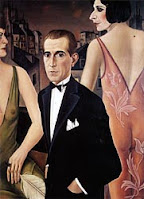August 30, 2004 [Napoleon Dynamite]
Somewhere between the expressionists and the surrealists, right there in the mid-1920s, critic Franz Roh noticed something going on in the art world that he called "Magic Realism"—just in time for Buster Keaton to make The General in 1927. Somehow, the magic trick that Roh saw in certain painters' work—in which everyday objects become mysterious, filled with strange properties while remaining their solid selves—but hiding something, something waiting for us to recognize its amazing clarity and simplicity—somehow the movies found this funny.
And maybe there is laughter waiting as we gaze at the magic objects:
—the calm man flanked by women in sheer dresses, a study of both nudes and of the man who has not yet seen them;
—the still life of bent fronds and simple containers, as assertively real as memories;
—the gangrenous churchyard crisp in its reality, the last thing standing after some slow apocalypse;
and among them, Buster Keaton stares like an American Gothic while behind him the Civil War plummets a real train into ruin, a matter-of-fact excitation as plain and uncanny as the Roman nose on Keaton's unblinking face. The deadpan comic mirrors the magician in a staring contest that we lose, because we laugh.
And maybe there is laughter waiting as we gaze at the magic objects:
—the calm man flanked by women in sheer dresses, a study of both nudes and of the man who has not yet seen them;
—the still life of bent fronds and simple containers, as assertively real as memories;
—the gangrenous churchyard crisp in its reality, the last thing standing after some slow apocalypse;
and among them, Buster Keaton stares like an American Gothic while behind him the Civil War plummets a real train into ruin, a matter-of-fact excitation as plain and uncanny as the Roman nose on Keaton's unblinking face. The deadpan comic mirrors the magician in a staring contest that we lose, because we laugh.
Napoleon lays it out for us in the first five minutes: He stands in front of his dinky house, waiting for the school bus. There's a cut to a low-angle shot as he opens a three-ring binder—we can't see what he's looking at—and the bus arrives, dorky-campy lounge organ music accompanying him as he makes his way to the back of the bus and sits next to a small boy who asks, "What're you gonna do today, Napoleon?" to which he snaps, "Whatever I feel like I wanna do—gosh!" and he jerks his head in spastic disdain and ties a string to a plastic action figure and tosses it out the window, where it skitters and bounces on the road behind them.
But he does not, it seems, live in a world where he can do what he wants. For a while he's in a cruel teen comedy, the other kids automatically teasing, shoving, ignoring him. In another movie he'd be the third banana, good for two or three funny-demeaning bits. But here he's the lead, and the camera catches him as he blunders along, often framing him in full figure, with sometimes more sky than Napoleon, as he wrestles with his family, his peers, and his own dogged sense of greatness. Eventually, his name makes sense; in the meantime, the Magic Realist non-plot meanders among alternately bland and grotesque characters who help and hinder him until he discovers exactly which sweet skills he needs to make friends and still be himself.
That is no mean feat: Napoleon is barely alive, his noisy sighs like a death-rattle. But he lives on—unlike his Uncle Rico, Napoleon's doppelgänger, the hint of a future burdened with the endless repetition of imaginary greatness and endless regret. Uncle Rico dreams of—no: lives in—a moment that never occurred, and as he videotapes himself throwing the winning pass that never was, over and over, he looks like an idiot—but the poor slob broke my heart, his home a van in a field with too much sky above, more than he or his football will ever need.
But it's not a sad story; in fact, like its Saturday matinee predecessors, the movie embraces the improbable and provides sudden victory and vindication. He may not have spent last summer with his uncle hunting wolverines with a freakin twelve-gauge, and he may not have any bow staff skills—let alone a bow staff—but, like his favorite animal, the liger (half lion, half tiger), he is bred for his skills in magic, a presto-change-o as sudden as a jump-cut.








Comments
Post a Comment